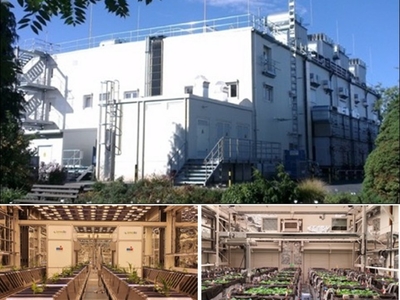IPPN-CEPPG Workshop on Environment Simulation and Plant Phenotyping

After the finalization of the DPPN funded Plant Cultivation Hall at IPK Gartersleben, the Controlled Environment Plant Phenotyping Working Group (CePPG) is hosting a workshop including international speakers, on-site & online.
More details on this new phenosphere will be presented in the upcoming IPPN-CEPPG Workshop on Environment Simulation and Plant Phenotyping on May 24th-25th in IPK Gatersleben including guided tours through IPK phenotyping facilities.
UPDATE: Link to registration now available!
The Controlled Environment Plant Phenotyping working Group (CEPPG) of the International Plant Phenotyping Network will hold a workshop on 24/25th of May 2022 as a hybrid meeting at IPK Gatersleben, Germany, and via Zoom VC. In total, 11 invited speakers will present updates on controlled-environment plant phenotyping in installations around the world, presenting methods, analyses, modelling, and results on simulation of natural conditions and assessment of plant performance. We invite everyone interested in the latest developments in these topics to participate in this event. The workshop will have limited capacity on-site, while nearly unrestricted participation will be possible via Zoom-VC.
During the workshop, a guided tour through IPKs whole plant phenotyping facilities will take place, including the new world-wide unique plant cultivation hall, a large phenosphere of 1000 m2 floor area that enables plant cultivation under strictly controlled dynamic field-like environmental conditions (to be recorded for subsequent viewing). On the evening of May 24th, a dinner will be held in the nearby medieval town of Quedlinburg (UNESCO World Heritage Site).
(Preliminary)Schedule and speakers:
Day 1 (24.05.2022)
(arrival, lunch)
14:00 „Opening, Welcome“ (Thomas Altmann, IPK, Gatersleben, Germany)
14:15 “Greeting and news about EMPHASIS and DPPN-ACCESS“ (Ulrich Schurr, FZJ, Jülich, Germany)
14:45 „Controlled environment whole plant phenotyping @ IPK“ (Kerstin Neumann, IPK, Gatersleben, Germany)
15:15 Coffee and guided tour through IPK whole plant phenotyping facilities (to be recorded)
17:00 „Climate simulation and phenotyping in the Plant Cultivation Hall Container/PhenoCrane System“ (Marc Heuermann, IPK, Gatersleben, Germany)
17:30 „Controlled environment Root and Shoot Phenotyping using the Plant Cultivation Hall Rhizotron System (Markus Kuhlmann, IPK, Gatersleben, Germany)
18:00 „Moving from 2D to 3D in linking phenotypic variation to genotypic variation in maize and sorghum“ (James Schnable, University of Nebraska-Lincoln, Lincoln, NE, USA)
18:30 „Integrated Root and Shoot Phenotyping of Crop Plants in Controlled Environments“ (Mitch Tuinstra, Purdue University, West Lafayette, IN, USA; online)
20:00 Dinner in Quedlinburg
Day 2 (25.05.2022)
09:00 “Dynamic controlled environments, 3D scanning, digital twins and scaling from lab to field - NextGen phenotyping - where to from here?” (Tim Brown, The Plant Phenomics Group at Australian National University, Canberra, Australia)
09:30 „Crop phenotyping in Huazhong Agricultural University“ (Wanneng Yang, Huazhong Agricultural University, Wuhan, China)
10:00 „Digital Twins: the virtual tomato crop for autonomous growing. “ (R. van de Zedde, Wageningen University & Research, Wageningen, The Netherlands)
10:30 „Phenotypic variation in morpho-physiological traits and seed secondary metabolites in Chenopodium quinoa (Willd.) Chilean ecotypes“ (Fabio Fiorani, FZJ, Jülich, Germany)
11:00 Coffee break
11:15 “Modelling expected climatic conditions for Europe” (Juliane El Zohbi, Climate Service Center Germany (GERICS) Helmholtz-Zentrum Hereon, Hamburg, Germany; online)
11:45 General Discussion
12:15 End of Workshop (lunch, departure)
Afternoon: opportunity of individual visits/meetings of/with IPK facilities (e.g. NMR) or groups (optional)
